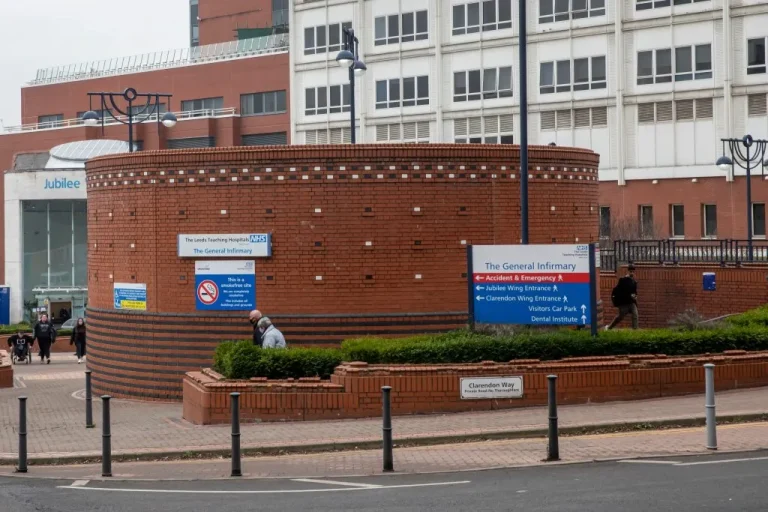Maternity failings at two Leeds hospitals have presented a significant risk to the safety of women and babies, and immediate improvements must be made, according to the health and care regulator.
The Care Quality Commission (CQC) this week downgraded maternity services at Leeds Teaching Hospitals NHS Trust from ‘good’ to ‘inadequate’.
“These reports have highlighted significant areas where we need to improve our maternity and neonatal services”
Phil Wood
The move by the CQC followed two unannounced inspections in December and January at the trust’s two main sites, Leeds General Infirmary and St James’s Hospital.
The inspections came after a BBC investigation earlier this year found that the deaths of at least 56 babies and two mothers across the hospitals, between January 2019 and July 2024, may have been preventable.
Since then, 47 new families have come forward to the BBC with concerns about inadequate maternity care between 2017 and 2024.
The hospitals are the latest to be at the centre of a growing national maternity scandal, which has also uncovered failings in Nottingham, Morecambe Bay, Shrewsbury and Telford and East Kent.
In maternity services, inspectors found that staff did not always have meaningful interactions with the people they were caring for.
They found that interactions were “mostly task orientated” due to time pressures created by low staffing.
Meanwhile, the environment was not always safe for people, with some dirty areas which could put people at risk of infection.
The CQC said maternity staff were reluctant to raise concerns, because they felt the trust had “a blame culture rather than a learning culture”.
This, it said, was impacting on the quality of care people were receiving.
Inspectors noted that medicines were not always stored or managed safely to make sure that people were not at risk of harm.
More positively, they did find that staff understood how to protect people from abuse, and that the service worked well with partner organisations to do so.
Further more, they found that people were provided with up to date and accurate information to help them make informed choices about their care.
In neonatal services, which were inspected for the first time as a standalone service, inspectors found that leaders had not ensured there were always enough staff with the right qualifications and skills to meet the needs of babies.
Similarly to the maternity services, they said leaders did not ensure the environment was always safe, with equipment and medicines not stored safely, securely or correctly.
The CQC also stated that the trust had not ensured there was a designated private space for mothers to express breast milk.
“We would like to thank all those people who bravely shared their concerns”
Ann Ford
Maternity services at both hospitals have declined from good to inadequate overall, as well as for being safe and well-led.
Effective and caring have been rated as requires improvement, while responsive was rated as good.
For neonatal services at both hospitals, they have been rated as requires improvement overall, and for being caring, responsive and well-led. Effective was rated as good and safe was rated as inadequate.
Overall, the rating for Leeds General Infirmary dropped from good to requires improvement, while St James’s University Hospital remains rated as requires improvement.
Ann Ford, CQC director of operations in the North, said: “Prior to our visit, we had received a number of concerns from staff, people using the services and their families about the quality of care being delivered, including staff shortages in maternity at both hospitals.
“During the inspection, the concerns were substantiated, and this posed a significant risk to the safety of women, people using these services, and their babies as the staff shortages impacted on the timeliness of the care and support they received.
“We would like to thank all those people who bravely shared their concerns. This helps us to have a better picture of the care being provided to people and to focus our inspection in the relevant areas.”
Ms Ford said the trust had been issued with a warning notice “to their attention on making improvements to maternity services”. It has also been asked for an action plan to address concerns set out by the CQC.
“We’ll be monitoring these services closely, including through further inspections, to make sure people receive safe care while these improvements are implemented,” Ms Ford added.
Chief executive of Leeds Teaching Hospitals NHS trust, Professor Phil Wood, said: “These reports have highlighted significant areas where we need to improve our maternity and neonatal services, and my priority is to make sure we urgently take action to deliver these improvements.
“I want to reassure every family due to have their baby with us in Leeds and any new parents that we are absolutely committed to providing safe, compassionate care.”
Professor Wood noted that the trust delivers more than 8,500 babies each year and “the vast majority of those are safe and positive experiences for our families”
He added: “But we recognise that’s not the experience of all families. The loss of any baby is a tragedy, and I am extremely sorry to the families who have lost their babies when receiving care in our hospitals.
“It is vital that as a trust we listen more to our families and understand their experiences and concerns so we can address these and ensure everyone’s experience is of the highest standard.”
In the CQC’s annual state of care report, published last year, the regulator said maternity care across England was an area of real concern.
It comes as the regulator undertook a national maternity inspection programme, which aimed to provide an up-to-date view of the quality of hospital maternity care across the country.
More from the CQC on maternity

